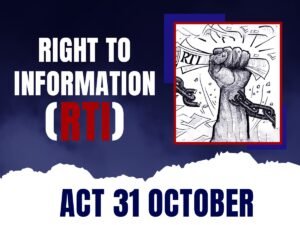For Prelims: Right to Information (RTI) Act, Central Information Commission
For mains: RTI and its benefits, Transparency & Accountability, advantages and disadvantages of the Right to Information (RTI) Act.
Why in the news?
A report claims that the number of appeals or complaints filed under the Right to Information (RTI) Act is steadily growing in the information commissions each year.
What are the report’s conclusions?
- Pendency of Cases:
- In India, there are currently 26 information commissions handling nearly 3.15 lakh complaints or appeals.
- In 2019, there were 2,18,347 pending complaints and appeals; by 2022, that number had risen to 3,14,323.
- Maharashtra had the most active cases, followed by Uttar Pradesh, Karnataka, etc.
- Defunct Information Commissions:
- Across the country, there are 29 information commissions, but only five percent of them have women in leadership positions; four of them are currently without a head, and two are completely inactive.
- For 29 and 15 months, respectively, Jharkhand and Tripura have been totally inactive. There are no chiefs in Manipur, Telangana, West Bengal, or Andhra Pradesh.
- Across the country, there are 29 information commissions, but only five percent of them have women in leadership positions; four of them are currently without a head, and two are completely inactive.
- Not Imposing Penalties:
- In 95% of the cases where penalties might have been imposed, the commissions chose not to do so.
- Tardy Disposal of Cases:
- Concerns about the late disposal rates in several commissions and the opaqueness of their operations are also raised in the report.
- e-filing facility for RTI Applications:
- Out of the 29 information commissions, only 11 offer an electronic filing option for RTI applications or appeals, and only five of those are operational.
What is the Right to Information (RTI) Act?
- A prompt response to citizen requests for government information is required by the Right to Information Act of 2005.
- The main goals of the Right to Information Act are to give citizens more power, advance transparency and accountability in government operations, combat corruption, and truly make democracy work for the people.
- Right to Information (Amendment) Act, 2019:
- It stated that the Chief Information Commissioner and an Information Commissioner (of the Center and States) would hold their positions for the duration of the Central Government’s prescribed term. They had a fixed 5-year term prior to this amendment.
- It stated that the Chief Information Commissioner and an Information Commissioner (of the Center as well as the States) shall receive compensation as set forth by the Central Government in terms of salary, benefits, and other terms of service.
- Before this amendment, the salary, benefits, and other terms of employment for the Chief Information Commissioner and each Information Commissioner (or State Election Commissioner in the case of States) were comparable to those of the Chief Election Commissioner.
- The provisions concerning salary deductions for the Chief Information Commissioner, an Information Commissioner, the State Chief Information Commissioner, and a State Information Commissioner due to pension or any other retirement benefits received by them for their prior public service were removed.
- On the grounds that it weakens the law and gives the central government more authority, the RTI (Amendment) Act, 2019, has drawn criticism.
- Issues in the Implementation:
- Public authorities’ failure to comply with the proactive disclosure requirement
- Public information officers (PIOs) misinterpret the Right to Information (RTI) Act’s provisions and take a hostile attitude toward citizens in order to withhold information.
- Public interest and the right to privacy are not clearly defined
- Insufficient political will and inadequate infrastructure
- refusal to respond to information requests made by engaged citizens on crucial issues affecting the public
- RTI advocates and applicants have been the targets of covert threats and attacks intended to silence them.
What is the Central Information Commission?
- Established: In accordance with the provisions of the Right to Information Act (2005), the Central Government established the Central Information Commission in 2005. This body lacks constitutional authority.
- Members: The Commission is made up of no more than ten Information Commissioners and a Chief Information Commissioner.
- They are appointed by the President based on the advice of a committee that includes the Prime Minister serving as Chairperson, the Leader of the Opposition in the Lok Sabha, and a Minister of the Union Cabinet that the Prime Minister has nominated.
- Term of office: The Chief Information Commissioner and each Information Commissioner shall serve until the earlier of their 65th birthday or the term set forth by the Central Government.
- They are not qualified for reappointment.
- Power and Functions of CIC:
- The Commission has a responsibility to hear complaints from anyone who requests information under RTI, 2005, and to look into them.
- If there are sufficient grounds, the Commission may order an inquiry into any matter (suo moto power).
- The Commission can summon people and demand documents during an investigation just like a civil court would.
Steps to be taken
- The effective operation of information commissions:
- For people to understand their right to information, information commissions must operate properly.
- Information commissions are required by the RTI law to protect and advance people’s fundamental right to information and serve as the final appellate authority.
- Transparency:
- The transparency watchdogs must work more efficiently and transparently immediately.
- Digitisation of the System:
- The digital RTI portal (website or mobile app) can provide services that are more effective and user-friendly for citizens than are possible through traditional modes.
- Both those who seek greater transparency and the government will benefit from this.

